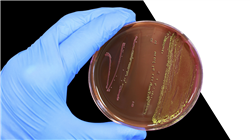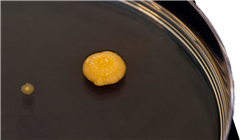University certificate
The world's largest faculty of pharmacy”
Description
This 100% online Postgraduate diploma will provide you with the necessary tools to effectively deal with Multidrug-Resistant Bacteria, improving clinical outcomes and patient safety”

With the alarming increase in bacterial strains exhibiting resistance to multiple antibiotics, treatment protocols have evolved toward more personalized and rigorous approaches. Strategies such as the use of antibiotics of last resort, combination therapies and the strict implementation of infection control measures are essential to combat this emerging problem.
This Postgraduate diploma will focus on the management of patients in Intensive Care Units (ICU) affected by infections caused by Multidrug-Resistant Bacteria. In this sense, pharmacists will acquire specialized knowledge in the effective treatment of these critical infections, as well as advanced skills in the prevention of their spread within the hospital environment.
Likewise, the agenda will focus on Multidrug-Resistant Gram Negative Bacteria, addressing the selection of appropriate empirical antibiotic therapies against these infections, which represent a growing challenge in clinical practice. Essential strategies for implementing Antimicrobial Stewardship Optimization Programs (PROs) will also be analyzed, which are essential to effectively manage these complex infections and reduce the development of resistance.
Finally, the critical implications of antibiotic resistance in Gram Positive Bacteria such as Streptococcus, Enterococcus and Staphylococcus for both Public Health and daily clinical practice will be examined. In addition, innovative strategies to mitigate the impact of antimicrobial resistance, including the rational use of antimicrobials and the development of new therapeutic modalities.
These detailed materials will provide graduates with a fully online methodology, allowing them to adjust their study schedule according to their personal and professional commitments. In addition, the innovative
Relearning system will be integrated, which facilitates the intensive assimilation of key concepts through strategic repetitions. In this way, graduates will be able to learn at their own pace and achieve mastery at their own pace and achieve a complete mastery of the latest scientific evidence.
You will be equipped with the skills to address current and future challenges associated with Gram Positive Resistant Bacteria, therefore strengthening your ability to provide high quality clinical care”
This Postgraduate diploma in Clinical Management of Multidrug-Resistant Bacteria contains the most complete and up-to-date scientific program on the market. The most important features include:
- The development of practical cases presented by experts in Microbiology, Medicine and Parasitology
- The graphic, schematic and eminently practical contents with which it is conceived gather scientific and practical information on those disciplines that are indispensable for professional practice
- Practical exercises where the self-assessment process can be carried out to improve learning
- Its special emphasis on innovative methodologies
- Theoretical lessons, questions to the expert, debate forums on controversial topics, and individual reflection assignments
- Content that is accessible from any fixed or portable device with an Internet connection
You will be immersed in implementing rational antibiotic use policies, promoting infection prevention measures, and fostering ongoing research into new antimicrobial agents”
The program’s teaching staff includes professionals from the field who contribute their work experience to this educational program, as well as renowned specialists from leading societies and prestigious universities.
The multimedia content, developed with the latest educational technology, will provide the professional with situated and contextual learning, i.e., a simulated environment that will provide immersive education programmed to learn in real situations.
This program is designed around Problem-Based Learning, whereby the professional must try to solve the different professional practice situations that arise during the course. For this purpose, the student will be assisted by an innovative interactive video system created by renowned and experienced experts

You will deal with the selection of the appropriate empirical antibiotic treatments when faced with the suspicion of Multi-drug Resistant Gram Negative Bacteria, through the best didactic materials, at the forefront of education and technology"
Syllabus
The program will include the diagnosis and treatment of infections caused by Multidrug-Resistant Bacteria, with a specific focus on the appropriate selection of antimicrobials and the management of Antimicrobial Optimization Programs (PROA). In addition, the prevention of Nosocomial Infections and strategies to reduce the spread of bacterial resistance will be discussed. The implications of antimicrobial resistance in public health and clinical practice will also be examined, preparing pharmacists to face these challenges with updated knowledge and advanced skills.

The content of this Postgraduate diploma in Clinical Management of Multidrug-Resistant Bacteria will cover a broad range of topics fundamental to the understanding and effective management of these emerging infections”
Module 1. Management of Patients with Multidrug-Resistant Bacterial Infections in Intensive Care Units (ICU)
1.1. Colonization and Infection of Patients in ICUs
1.1.1. Types of ICUs
1.1.2. Epidemiology
1.1.3. Risk Factors Associated with Infection in ICUs
1.2. Impact of Nosocomial Infections in the Critically Ill Patient
1.2.1. Importance of Nosocomial Infections in ICUs
1.2.2. Risk Factors for Nosocomial Infections
1.2.2.1. Patient Factors
1.2.2.2. Factors of the ICU Environment
1.2.2.3. Factors Related to the Healthcare Personnel
1.2.3. Impact of Nosocomial Infections in Immunocompromised Patients
1.2.4. Impact on Length of Stay in the ICU
1.3. Pneumonia Associated with Mechanical Ventilation
1.3.1. Etiology
1.3.2. Diagnosis
1.3.3. Treatment
1.4. Urinary Tract Infections Associated with Catheters
1.4.1. Etiology
1.4.2. Diagnosis
1.4.3. Treatment
1.5. Primary Bacteremias and Catheter-Related Bacteremias
1.5.1. Etiology
1.5.2. Diagnosis
1.5.3. Treatment
1.6. Pseudomembranous Colitis
1.6.1. Etiology
1.6.2. Diagnosis
1.6.3. Treatment
1.7. Infections by Opportunistic Pathogens
1.7.1. Etiology
1.7.2. Diagnosis
1.7.3. Treatment
1.8. Appropriate Use of Antibiotics
1.8.1. Programs for the Optimization of Antibiotic use (PROA) in the ICU
1.8.2. Antibiotic Therapy Strategies for the Treatment of Gram-Negative Patients
1.8.3. Antibiotic Therapy Strategies for the Treatment of Gram-Positive Patients
1.8.4. Antibiotic Therapy Strategies for the Treatment of Co-Infections
1.9. Strategies for the Prevention of BMR Infections in the ICU
1.9.1. Hygiene Measures
1.9.2. Infection Control Measures
1.9.3. Protocols and Clinical Practice Guidelines
1.9.4. Education and Training of ICU Personnel
1.9.5. Participation of Patients and their Families
1.10. Infection Prevention Strategies in the ICU
1.10.1. Infection Prevention Strategies in the ICU According to the Focus
1.10.1.1. Pneumonia
1.10.1.2. Bacteremia
1.10.1.3. Urinary Infection
1.10.2. Evaluation and Quality Indicators in the Prevention of Infections
1.10.3. Evaluation and Continuous Improvement Tools
1.10.4. Successful Examples of Infection Prevention in ICUs
Module 2. Multidrug-Resistant Gram Negative Bacteria
2.1. Infections Due to Gram-Negative Microorganisms
2.1.1. Epidemiology of Gram-Negative Microorganisms
2.1.2. Community and Nosocomial Infections by Gram-Negative Microorganisms
2.1.3. Relevance of Infections by Multidrug-Resistant Gram-Negative Microorganisms
2.2. Pathogenesis of Infections by Gram-Negative Microorganisms
2.2.1. Factors Related to Gram-Negative Microorganisms
2.2.2. Patient Factors in Gram-Negative Infections
2.2.3. Other Factors in Gram-Negative Infections
2.3. Clinical Evaluation of Patients with Multidrug-Resistant Gram-Negative Infections
2.3.1. Medical History
2.3.2. Clinical Evaluation of Patients
2.3.3. Other Data of Interest
2.4. Complementary Tests in Infections by Multidrug-Resistant Gram-Negative Microorganisms
2.4.1. Blood Tests
2.4.2. Imaging Tests
2.4.3. Microbiological Techniques
2.5. Estimation of Severity in Patients with Infections by Multidrug-Resistant Gram-Negative Microorganisms
2.5.1. Gram-Negative Multidrug-Resistant Microorganisms
2.5.2. Traditional Approach to Severity Estimation
2.5.3. Practical Conclusions
2.6. Risk of Acquiring Infections by Multidrug-Resistant Gram-Negative Microorganisms
2.6.1. Clinical Factors in the Acquisition of Infections by Multidrug-Resistant Gram-Negative Microorganisms
2.6.2. Other Factors in the Acquisition of Infections by Multidrug-Resistant Gram-Negative Microorganisms
2.6.3. Tools to Calculate the Risk of Presence of Multidrug-Resistant Gram-Negative Microorganisms
2.7. Empirical Treatment in the Suspicion of Infections by Multidrug-Resistant Gram-Negative Microorganisms
2.7.1. Microorganisms Involved According to Localization
2.7.2. Comprehensive Assessment of Patients with Suspected Infections by Multidrug-Resistant Gram-Negative Microorganisms
2.7.3. Selection of Empirical Antibiotic Treatment
2.8. Targeted Therapy in Infections by Multidrug-Resistant Gram-Negative Microorganisms
2.8.1. Adjustment of Antibiotic Therapy According to Microbiological Results
2.8.2. Follow-up of Multidrug-Resistant Gram-Negative Microorganism Infection
2.8.3. Most Relevant Side Effects of Antibiotherapy
2.9. Duration of Antibiotherapy in Infections by Multidrug-Resistant Gram-Negative Microorganisms
2.9.1. Estimation of the Duration of Antibiotic Treatment in Infections by Multidrug-Resistant Gram-Negative Microorganisms
2.9.2. Relevance of Focus Control in Infections by Multidrug-Resistant Gram-Negative Microorganisms
2.9.3. Special Considerations Related to Antibiotic Therapy in These Infections
2.10. PROA Teams in Infections Caused by Multidrug-Resistant Gram-Negative Microorganisms
2.10.1. PROA Teams: History
2.10.2. Impact of PROA Teams on the Correct Use of Antibiotic Treatments
2.10.3. Challenge of PROA Teams in the Treatment of Infections Caused by Multidrug-Resistant Gram-Negative Microorganisms
Module 3. Antibiotic Resistance in Streptococcus, Enterococcus and Staphylococcus
3.1. Infections Due to Gram-Positive Bacteria
3.1.1. Natural Habitat of Gram-Positive Pathogens
3.1.2. Nosocomial Infections due to Gram-Positive Bacteria
3.1.3. Community-Acquired Infections by Gram-Positive Bacteria
3.2. In Vitro and in Vivo Systems for the Study of Resistance in Gram-Positive Bacteria
3.2.1. Biofilms
3.2.2. Cellular Models
3.2.3. Animal Models
3.3. Streptococcus Pneumoniae
3.3.1. Clinical Significance
3.3.2. Resistance Mechanisms
3.3.3. Biofilms
3.3.4. Treatment Options
3.4. Streptococcus Pyogenes
3.4.1. Clinical Significance
3.4.2. Resistance Mechanisms
3.4.3. Biofilms
3.4.4. Treatment Options
3.5. Streptococcus Agalactiae
3.5.1. Clinical Significance
3.5.2. Resistance Mechanisms
3.5.3. Biofilms
3.5.4. Treatment Options
3.6. Enterococcus Faecalis
3.6.1. Clinical Significance
3.6.2. Resistance Mechanisms
3.6.3. Biofilms
3.6.4. Treatment Options
3.7. Enterococcus Faecium
3.7.1. Clinical Significance
3.7.2. Resistance Mechanisms
3.7.3. Biofilms
3.7.4. Treatment Options
3.8. Staphylococcus Aureus
3.8.1. Clinical Significance
3.8.2. Resistance Mechanisms
3.8.3. Biofilms
3.8.4. Treatment Options
3.9. Mycobacterium Tuberculosis
3.9.1. Clinical Significance
3.9.2. Resistance Mechanisms
3.9.3. Treatment Options
3.10. Resistance in Other Gram-Positive Bacteria
3.10.1. Coagulase-Negative Staphylococcus
3.10.2. Clostridioides Difficile
3.10.3. Emerging Gram Positive Pathogens

The teaching materials of this program, elaborated by these specialists, have contents that are completely applicable to your professional experiences"
Postgraduate Diploma in Clinical Management of Multidrug-Resistant Bacteria
This Postgraduate Diploma in Clinical Management of Multidrug-Resistant Bacteria offered by TECH Global University is a specialized course for health professionals who wish to acquire advanced knowledge in the effective management of infections caused by bacteria resistant to multiple antibiotics. This program, offered 100% online, provides an in-depth understanding of the challenges posed by multidrug-resistant bacteria and the most up-to-date strategies for their clinical approach. During the course, you will explore the mechanisms of bacterial resistance, the epidemiology of multidrug-resistant bacteria and the latest recommendations for rational antimicrobial use. In addition, key topics such as the identification of resistant strains, the design of effective therapeutic schemes and the implementation of infection prevention and control measures in clinical settings will be addressed. One of the distinctive features of this program is its practical approach based on the latest scientific evidence, which will allow you to develop critical skills in clinical decision making and comprehensive care of patients with complex infections.
Specialize in the clinical management of multidrug-resistant bacteria
The online modality of the course offers flexibility and accessibility, allowing you to access the content from any location and at convenient times. Through an advanced educational platform, you will benefit from interactive resources and updated didactic material on clinical microbiology and antimicrobial resistance. The program is led by a team of professionals with extensive experience in the clinical management of multidrug-resistant bacteria, who provide expert guidance and ongoing support throughout the course. Their practical experience and up-to-date knowledge ensure high quality training relevant to the needs of current clinical practice. Enrolling in this Postgraduate Diploma is a strategic decision for healthcare professionals who want to be at the forefront of addressing challenging infections and improving the quality of care for their patients. This advanced program provides the tools and knowledge necessary to effectively address the growing problem of multidrug-resistant bacteria in the clinical setting.







